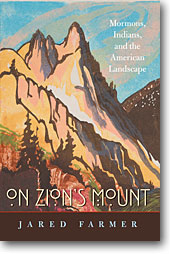University
Communications
Office
Arkansas State University
Jonesboro,
Arkansas
Staff
Markham Howe
Sara McNeil
Gina Bowman
(870) 972-3056
fax (870) 972-3693
More information:
NewsPage
Links to News Releases
& Announcements
KASU
Public Newsroom
KASU Local News
Campus Calendar
Public activities at ASU
About
ASU
Overview, history
and more |
Prize-winning environmental
historian and author Jared Farmer to lecture March 9
March 3,
2010 -- Environmental
historian Dr. Jared Farmer will present a free public lecture, “The
Global in the Local” at Arkansas State University on Tuesday,
March 9, at 4 p.m., in the Mockingbird Room of the Reng Student Services
Center/Student Union, 101 N. Caraway Road, Jonesboro. His visit is
sponsored by the Heritage Studies Ph.D. program and the Department of
History. Dr. Farmer’s most recently published book, “On Zion’s Mount:
Mormons, Indians, and the American Landscape” (Harvard University Press,
2008), has won four awards, including the highly prestigious 2009
Francis Parkman Prize from the Society of American Historians.
Dr. Farmer’s lecture, “The Global in the Local,” will contain insights
both from his prize-winning book and from his present research. He is
currently a resident Fellow at the National Humanities Center in North
Carolina’s Research Triangle Park, where he is writing his newest book,
“Trees in Paradise: A California History.”
Dr. Farmer received his B.A. in history from Utah State University, his
M.A. in history from the University of Montana, and his Ph.D. in history
from Stanford University. He specializes in the environmental history of
the U.S. West and is also the author of “Glen Canyon Dammed: Inventing
Lake Powell and the Canyon Country (1999).”
In May 2007, Dr. Farmer accepted a
tenure-track assistant professorship in history at Stony B rook University, a
campus of the State University of New York. Dr. Farmer’s history
position is affiliated with a new center, the Consortium for
Inter-Disciplinary Environmental Research
(CIDER). This initiative was undertaken to bring together the many
faculty at the university from diverse disciplines, housed in many
departments, to create synergistic collaborations that could address
large, complex environmental issues. rook University, a
campus of the State University of New York. Dr. Farmer’s history
position is affiliated with a new center, the Consortium for
Inter-Disciplinary Environmental Research
(CIDER). This initiative was undertaken to bring together the many
faculty at the university from diverse disciplines, housed in many
departments, to create synergistic collaborations that could address
large, complex environmental issues.
When Dr. Farmer accepted the Parkman Prize in New York City on April 17,
2009, he explained his approach
to writing environmental history: “Historical fashions come and go: we
have been admonished to remember the nation-state, to go beyond it, to
embrace the transnational, to recognize the global, to return to the
local. As a scholar and a
writer, I’ve tried to creatively illustrate how the world turns in all
these spheres at once. The best global histories will have some of the
local in them, and vice versa… There are so many ways to play with the
concept of scale. It’s exciting to contemplate a literary analogue or
complement to Geographic Information Systems or Google Earth. Our
narrative histories can be maps of words”
For more information about this event, contact Dr. Clyde Milner II
(cmilner@astate.edu),
director, Heritage Studies PhD program and professor of history, at
(870) 972-3509.
# # #
|
